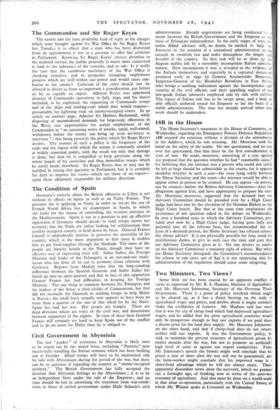The Commandos and Sir Roger Keyes The easiest and the
least profitable kind of reply to the charges which were brought against the War Office by Sir Roger Keyes last Tuesday is to object that a man who has been dismissed from an appointment is not in a position to offer fair criticism in Parliament. Knowing Sir Roger Keyes' intense devotion to the national service, the public generally is much more concerned to look to the substance of his remarks, and to ask : Is it really the case that the cumbrous machinery of the War Office is checking initiative, and in part4cular strangling amphibious projects which are well within our power and would cause con- fusion to the enemy? Criticism of the critic should not be allowed to divert us from so important a consideration. , put before us by so capable an. expert. Admiral Keyes was appointed director of Commando operations in July, 1940, and his duties included, as he explained, the organising of Commando troops and of the ships and landing-craft which they would require— presumably for lightning raids on enemy-occupied coasts. In an article on another page, Admiral Sir Herbert Richmond, while disposing of unconsidered demands for large-scale offensives in the West, sees opportunities for useful employment of the Commandos in " an unceasing series of attacks, rapid, well-aimed, withdrawn before the enemy can bring up even air-forces to intervene "—this being precisely the policy which Sir Roger Keyes desires. The essence of such a policy is the frequency of the raids and the vigour with which the enemy is constantly assailed at widely separated points, with the result not only that damage is done, but that he is compelled to keep garrisons along the whole length of his coast-line and thus immobilise troops which he sorely needs elsewhere. Sir Roger Keyes may or may not be justified in raising this question in Parliament, but it is certainly his duty to impress his views—which are those of an. expert— upon those ultimately responsible for military direction.


























 Previous page
Previous page